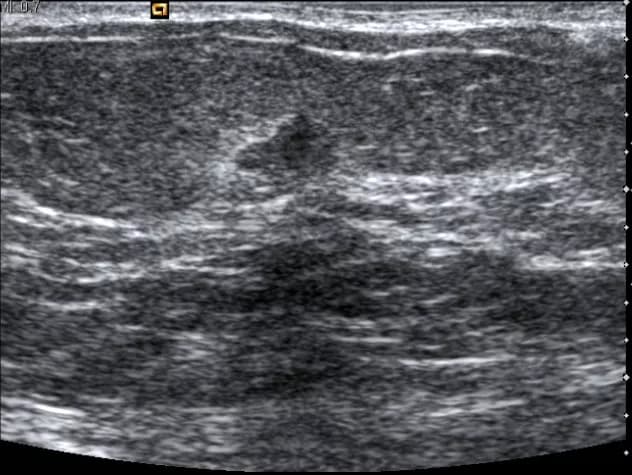
Aggressive Breast Cancers May Contribute To Racial Survival Disparities
A higher proportion of aggressive breast cancer subtypes are seen in black women, University of North Carolina Lineberger Comprehensive Cancer Center researchers have found. The study findings help to explain a gap in mortality that exists between black and white women with breast cancer, and could lead to improved treatment approaches to help close it.
In the Journal of the National Cancer Institute, researchers published results of an analysis of approximately 1,000 invasive breast tumors. The study confirmed that young black women are more likely to have "triple negative," or "basal-like," breast cancers, a subtype that does not express any of the receptors for targeted biologic therapies. The study also identified variation by race within a clinical breast cancer type that has the greatest mortality disparity. Researchers found that younger black women with hormone-receptor positive, HER2-negative breast cancer were more likely to have a high risk of recurrence score.
"When we look at a more clinically homogeneous group, such as women who have hormone-responsive, HER2-negative disease, we see pretty significant and biologically important differences between black and white women," said the study's lead author Melissa Troester, PhD, UNC Lineberger member and professor of epidemiology in the UNC Gillings School of Global Public Health. "With genomic information, we're better able to say which patients are likely to have indolent -- or slow-growing -- disease. And right now, we might mistake some people as having indolent disease, when actually they have a more aggressive tumor."
The study was part of the third phase of the seminal Carolina Breast Cancer Study, a population-based study launched at UNC-Chapel Hill in 1993. A driving motivation for the study has been to understand why African-American women disproportionately die from breast cancer. Since 1993, the study has gathered data on more than 8,000 women from 44 counties in North Carolina.
In the new study, researchers compared the findings of commonly used immunohistochemical tests, which classify breast cancer according to tumor markers, with the findings of the PAM50 gene expression assay, which classifies tumors into different risk groups as well as different molecular subtypes based upon each tumor's genomic characteristics.
Confirming previous findings, researchers found that black women were less frequently diagnosed with luminal A breast cancer, a subtype of breast cancer that has a better prognosis overall. Black women had significantly higher odds of all three non-luminal A breast cancer subtypes: Their odds of basal-like breast cancer, a particularly aggressive subtype, were three times higher for black women compared to white women; odds were 45 percent higher for luminal B breast cancer or black women, and odds were twice that of white women for HER2-enriched breast cancer.
"If you look at the group of basal-like breast cancers, the burden of this disease is much higher if you're young and black," said UNC Lineberger's Lisa A. Carey, MD, physician-in-chief of the N.C. Cancer Hospital. "We believe this is playing a role in racial disparities in outcomes between young and old, and black and white women with breast cancer."
They also found variation within a clinically defined subtype -- the hormone-receptor positive, HER2-negative subtype in particular. Hormone receptor-positive, HER2-negative breast cancer has the best prognosis overall, but the researchers report mortality disparities are also greatest within this group. In both black and white women, hormone receptor positive, HER2-negative breast cancer tumors were sometimes classified into the more aggressive genomic subtypes, including as basal-like breast cancer. In addition, on average, black women's tumors were more often classified into aggressive subtypes and had higher risk of recurrence scores within this group.
The findings underscore the role for genomic testing to drive precision medicine approaches to treatment, and may help explain a disparity in survival for black women with this type of breast cancer. In addition, the findings could have important clinical implications: Black patients with higher risk of recurrence scores could be candidates for chemotherapy or new treatment approaches, since high-risk scores are an indication for chemotherapy.
"If you really have a luminal A, low-risk tumor, and you were hormone receptor-positive and HER2-negative, you could be treated less aggressively, and have different surgical options," Troester said. "But if you had these other tumor genomic subtypes, your doctor might consider a more aggressive treatment plan. We can do better to distinguish aggressive and indolent cancers if we use the genomic data that is becoming available."
Materials provided by UNC Lineberger Comprehensive Cancer Center. Note: Content may be edited for style and length.
Disclaimer: DoveMed is not responsible for the accuracy of the adapted version of news releases posted to DoveMed by contributing universities and institutions.
Primary Resource:
Melissa A. Troester, Xuezheng Sun, Emma H. Allott, Joseph Geradts, Stephanie M. Cohen, Chiu-Kit Tse, Erin L. Kirk, Leigh B. Thorne, Michelle Mathews, Yan Li, Zhiyuan Hu, Whitney R. Robinson, Katherine A. Hoadley, Olufunmilayo I. Olopade, Katherine E. Reeder-Hayes, H. Shelton Earp, Andrew F. Olshan, Lisa A. Carey, Charles M. Perou. (2018). Racial differences in PAM50 subtypes in the Carolina Breast Cancer Study. JNCI: Journal of the National Cancer Institute, 110(2). DOI: 10.1093/jnci/djx135
Related Articles
Test Your Knowledge
Asked by users
Related Centers
Related Specialties
Related Physicians
Related Procedures
Related Resources
Join DoveHubs
and connect with fellow professionals

0 Comments
Please log in to post a comment.